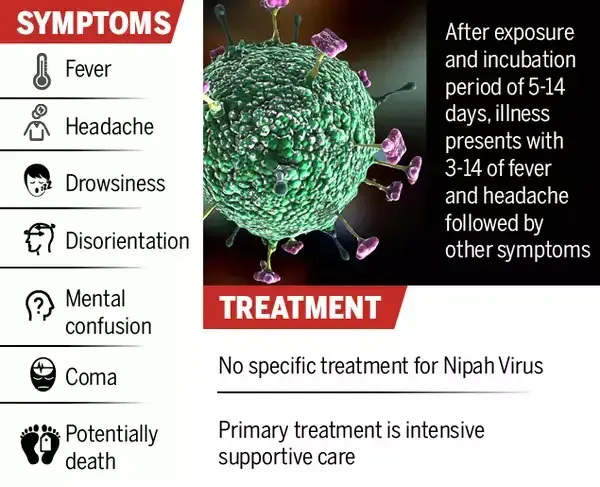Nipah Virus Claims Life, 150 Contacts Isolated
Why in the news?
A 24-year-old man in Kerala has died from Nipah virus, prompting health authorities to isolate 150 primary contacts and activate strict protocols to prevent further spread.
About Nipah Death Confirmed and Action Taken:
- A 24-year-old man from Wandoor, Malappuram, Kerala, died of Nipah infection, confirmed by the National Institute of Virology, Pune.
- The man, a student from Bengaluru, was initially treated for hepatitis but later showed symptoms of encephalitis.
- His samples tested positive for Nipah.
- Following confirmation, the Health Department activated 16 committees under the Nipah protocol to control the situation.
About Nipah Virus:
- Nipah Virus (NiV) is a zoonotic virus transmitted from animals to humans.
- The virus was first reported in Malaysia (1998) and Singapore (1999).
- Host Reservoir: Fruit bats (flying foxes) are the primary hosts, transmitting it to pigs, dogs, cats, and other animals.
- Transmission: Spread through direct contact with infected animals or consumption of food contaminated by bat saliva/urine.
- Human-to-human transmission is also possible.
Symptoms and Impact
- Symptoms: Fever, respiratory issues, sore throat, and encephalitis (brain swelling).
- Severe cases may lead to seizures and coma.
- Fatality Rate: High mortality rate of 70%.
- Treatment: No specific vaccine or cure. Supportive care is the main treatment.
- Ribavirin, an antiviral, was used in past outbreaks to treat encephalitis.
Prevention and Response
- Prevention: Avoid contact with bats, refrain from consuming contaminated fruits, and practise good hygiene.
- Healthcare Precautions: Strict infection control for healthcare workers treating Nipah patients.
- Ongoing Research: Vaccines are being developed, and improving early detection and outbreak management strategies is crucial to controlling future outbreaks.
Re-emerging Viral Infections in India:
- COVID-19: The pandemic had multiple waves, with lockdowns, vaccinations, and other measures implemented to control it.
- Nipah Virus: Outbreaks, particularly in Kerala, have prompted isolation protocols and surveillance efforts.
- Zika Virus: Reported in Rajasthan and Gujarat, it poses risks of birth defects.
- Dengue & Chikungunya: Seasonal outbreaks managed through mosquito control and public health efforts.
- Avian Influenza: Managed through culling infected poultry and monitoring farms.
- Swine Flu: Public health : campaigns and vaccinations control its spread.
Origin and Structure of Nipah Virus
- Nipah first appeared in Malaysian pig farmers in 1999 and later in Bangladesh and India.
- It has a negative-sense RNA genome, part of the Henipavirus genus.
- NiV can spread through direct contact with animals, consumption of contaminated food, or human-to-human transmission.




